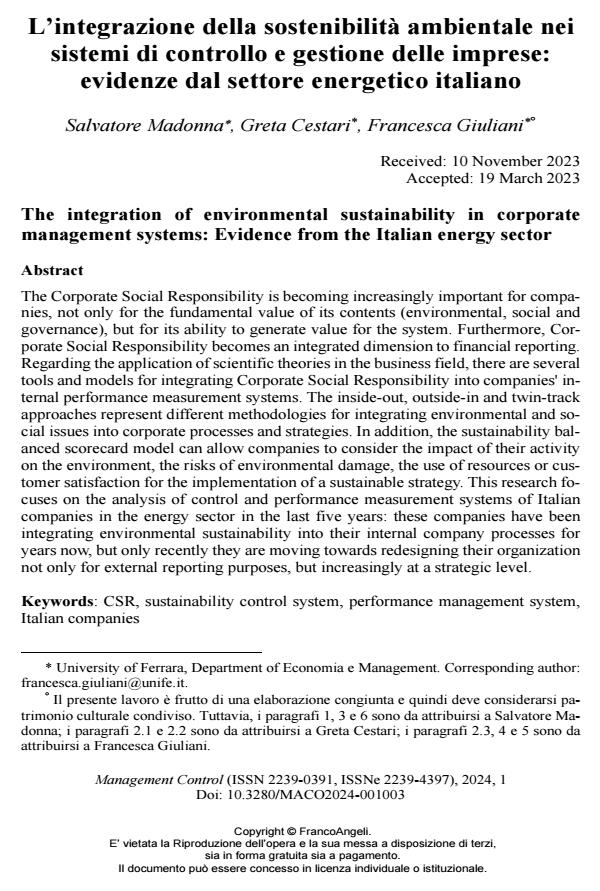The integration of environmental sustainability in corporate management systems: Evidence from the Italian energy sector
Journal title MANAGEMENT CONTROL
Author/s Salvatore Madonna, Greta Cestari, Francesca Giuliani
Publishing Year 2024 Issue 2024/1
Language Italian Pages 23 P. 39-61 File size 268 KB
DOI 10.3280/MACO2024-001003
DOI is like a bar code for intellectual property: to have more infomation
click here
Below, you can see the article first page
If you want to buy this article in PDF format, you can do it, following the instructions to buy download credits

FrancoAngeli is member of Publishers International Linking Association, Inc (PILA), a not-for-profit association which run the CrossRef service enabling links to and from online scholarly content.
The Corporate Social Responsibility is becoming increasingly important for com-panies, not only for the fundamental value of its contents (environmental, social and governance), but for its ability to generate value for the system. Furthermore, Corporate Social Responsibility becomes an integrated dimension to financial re-porting. Regarding the application of scientific theories in the business field, there are sev-eral tools and models for integrating Corporate Social Responsibility into compa-nies' internal performance measurement systems. The inside-out, outside-in and twin-track approaches represent different methodologies for integrating environ-mental and social issues into corporate processes and strategies. In addition, the sustainability balanced scorecard model can allow companies to consider the im-pact of their activity on the environment, the risks of environmental damage, the use of resources or customer satisfaction for the implementation of a sustainable strategy. This research focuses on the analysis of control and performance meas-urement systems of Italian companies in the energy sector in the last five years: these companies have been integrating environmental sustainability into their in-ternal company processes for years now, but only recently they are moving to-wards redesigning their organization not only for external reporting purposes, but increasingly at a strategic level.
Keywords: CSR, sustainability control system, performance management system, Italian companies
- Percorsi di decarbonizzazione e sistemi di controllo: un modello di analisi per il settore energetico Enrico De Camillis, Teresa Izzo, Daniela Mancini, in MANAGEMENT CONTROL 2/2025 pp.179
DOI: 10.3280/MACO2025-002009
Salvatore Madonna, Greta Cestari, Francesca Giuliani, L’integrazione della sostenibilità ambientale nei sistemi di controllo e gestione delle imprese: evidenze dal settore energetico italiano in "MANAGEMENT CONTROL" 1/2024, pp 39-61, DOI: 10.3280/MACO2024-001003